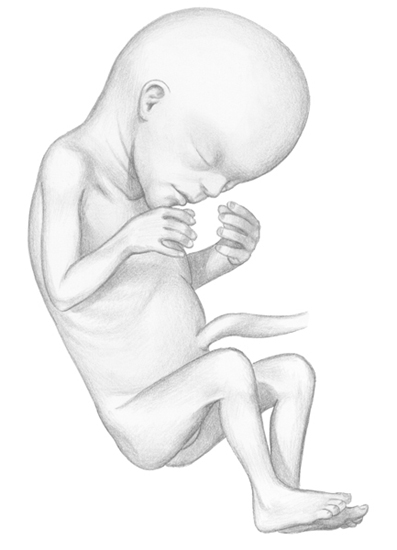1. How Big Is Your Baby?
The crown-to-rump length is 3¼
to 4 inches (8 to 9.3cm). Your baby is about the size of your fist and
weighs almost 1 ounce (25g).
2. How Big Are You?
Maternity clothes may be a
“must” by now. Some women try to get by for a while by not buttoning or
zipping their pants all the way or by using rubber bands or safety pins
to increase the size of their waistbands. Others wear their partner’s
clothing, but that usually works for only a short time. You’ll enjoy
your pregnancy more and feel better with clothing that fits comfortably
and provides you room to grow.
3. How Your Baby Is Growing and Developing
Baby’s ears have moved to the sides of its head. The neck continues to grow, and the chin no longer rests on the chest.

Your baby continues to change. Ears and eyes move
to a more normal position by this week.
4. Skin Tags and Moles
Pregnancy can make skin tags and moles change and grow. Skin tags are small tags of skin that may appear for the first time or may grow larger during pregnancy. Moles
may appear for the first time during pregnancy, or existing moles may
grow larger and darken. If you notice any changes in a mole, show it to
your healthcare provider!
5. Do You Have Hemorrhoids?
Hemorrhoids (dilated blood vessels
around or inside the anus) are a common problem during or after
pregnancy. Pregnant women often develop hemorrhoids during the second
and third trimesters. Hormone changes and the growing baby are
contributing factors. Hemorrhoids may worsen toward the end of
pregnancy. They may also get worse with each succeeding pregnancy.
Don’t take flax oil (it’s not the same
as flaxseed oil). Flax oil is often recommended as an herbal treatment
for constipation. If taken during the second and third trimesters, it
may increase your risk of premature birth.
Eat lots of fiber, and drink lots of
fluid. Stool softeners and bulk fiber products may also help. Fiber
tablets, wafers or fiber products you can add to any food or drink
without adding texture may also be good remedies.
If hemorrhoids cause a lot of discomfort,
discuss it with your healthcare provider. He or she will know what
treatment method is best for you. Try the following for relief.
• Rest at least 1 hour every day with your feet and hips elevated.
• Lie with your legs elevated and knees slightly bent when you sleep at night.
• Eat lots of fiber, and drink lots of fluid.
• Take warm (not hot) baths for relief.
• Suppository medications, available without a prescription, may help.
• Over-the-counter products that
contain hydrocortisone may help relieve itching and swelling. Ask your
healthcare provider about them.
• Apply ice packs, cold compresses or cotton balls soaked in witch hazel to the affected area.
• Don’t sit or stand for long periods.
• Get up and walk often to relieve pressure on the anus.
• If you experience pain, acetaminophen may help relieve it.
After pregnancy, hemorrhoids
usually improve, but they may not go away completely. Use the above
treatment methods when pregnancy is over.